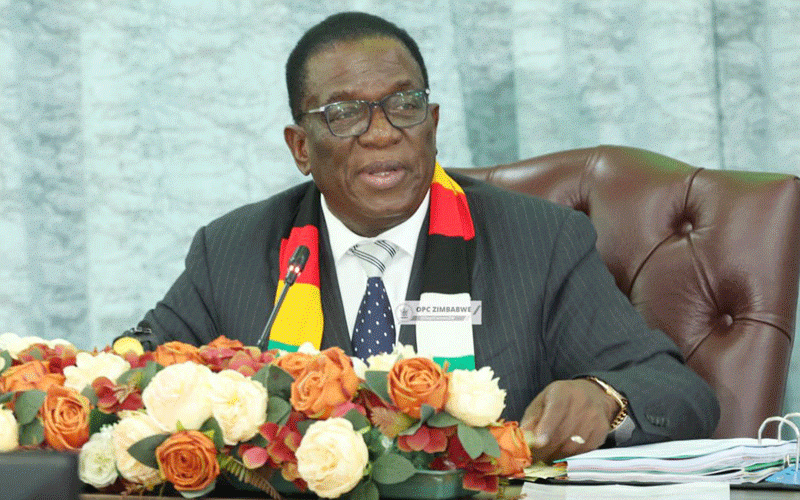
ZIMBABWE'S public sector reform agenda reached a symbolic milestone last week at Harare's State House, where Transport minister Felix Mhona's coronation as the best-performing minister highlighted both the ambitious scope and inherent contradictions of President Emmerson Mnangagwa's performance contract system.
The ceremony, marking the fourth year of this governance experiment, provides a critical moment to examine how performance metrics intersect with development realities in a nation pursuing upper-middle-income economic status by 2030.
The performance contract framework, introduced in 2021, represents Zimbabwe's most comprehensive attempt to revolutionise public service delivery.
Mnangagwa's declaration: "Governments are no longer measured by promises but by high performance" signals a paradigm shift in governance philosophy.
However, the transition from promise to performance faces substantial challenges in implementation and measurement, particularly in harmonising institutional achievements with citizen experiences.
Transport infrastructural development, which earned Mhona top honours, exemplifies these complexities. While the ministry celebrates road rehabilitation projects and Zinara's first clean audit, Zimbabwe's position at 117th on the World Economic Forum's Quality of Roads Index reveals a stark disconnect.
The contrast between official achievements and ground realities raises fundamental questions about evaluation criteria and their relevance to citizen needs. Urban commuters battling potholed streets and rural communities cut off during rainy seasons may question whether current metrics adequately capture service delivery quality.
Agricultural sector performance presents equally complex narratives. Anxious Masuka's runner-up position acknowledges efforts in food security and rural development, yet Zimbabwe's agricultural productivity metrics tell a different story. With maize yields averaging 1,4 tonnes per hectare against the Sadc region's 2,1 tonnes and persistent food insecurity in multiple provinces, the gap between institutional recognition and agricultural transformation remains significant. The sector's performance evaluation must expand beyond production statistics to encompass sustainability, climate resilience and smallholder farmer empowerment.
- 340km of Harare-B/bridge highway revamp complete
- Airports Company strikes mega hotel deal
- Chinese chrome smelters wreak havoc on Gweru’s roads
- 340km of Harare-B/bridge highway revamp complete
Keep Reading
The provincial dimension of performance contracts, exemplified by Masvingo's targeted US$8 billion economy, introduces additional layers of complexity. Minister Chadzamira's award raises questions about regional development equity and the metrics used to assess provincial progress. The challenge lies in ensuring that provincial economic targets translate to meaningful improvement in living standards, employment creation and poverty reduction at the household level.
Independent consultants' involvement in performance evaluation, while aimed at ensuring objectivity, demands greater scrutiny. The methodology must evolve beyond traditional audit approaches to incorporate citizen feedback, social impact assessments and alignment with international development frameworks. Rwanda's Imihigo system offers key lessons in integrating community perspectives into performance evaluation, while Singapore's PS21 framework demonstrates the potential of digital solutions in tracking public service delivery.
Institutional reform achievements, such as Zinara's clean audit, must be contextualised within broader governance challenges.
Zimbabwe's ranking of 157 out of 180 countries in Transparency International's Corruption Perception Index suggests that individual institutional successes, while commendable, are yet to catalyse systemic transformation.
The performance contract system must address corruption vulnerabilities, revenue leakages and governance weaknesses across the public sector.
The tourism sector's reported 15% GDP contribution illustrates the need for more comprehensive evaluation frameworks. Beyond headline figures, performance metrics must capture employment quality, revenue distribution, environmental sustainability and community benefits. Similar comprehensive evaluation approaches should apply to initiatives like the Presidential Title Deeds Programme, where success measures must include accessibility, equity and long-term impact on urban development.
Digital transformation objectives, emphasised in Mnangagwa's call for online service deployment, require careful integration into performance metrics. The evaluation framework must balance technological advancement with digital inclusion, ensuring modernisation efforts do not exacerbate existing social and economic disparities. Lessons from global e-governance initiatives suggest that success depends on combining digital innovation with robust citizen engagement mechanisms.
Gender responsiveness and social inclusion represent critical gaps in the current system. The relatively low visibility of gender-specific achievements in performance evaluations indicates the need for more intentional incorporation of gender equality metrics. Performance contracts should explicitly address gender budgeting, women's economic empowerment and inclusive development objectives aligned with Sustainable Development Goals.
As Zimbabwe approaches the midpoint of its Vision 2030 journey, the performance contract system requires substantial refinement. Integration with African Union Agenda 2063 targets could provide additional benchmarks for success, while enhanced transparency through public access to detailed performance reports would strengthen accountability.
The system must evolve to include penalties for underperformance, rewards for innovation, and mechanisms for continuous improvement based on citizen feedback.
This demands a delicate balance between celebrating achievements and addressing systemic challenges.
While the State House ceremony recognises individual excellence, the broader objective must be transforming institutional culture, improving service delivery, and accelerating national development. Zimbabwe's performance contract system, despite its current limitations, has the potential to drive meaningful public sector reform if enhanced with more comprehensive metrics, stronger accountability mechanisms and genuine citizen participation.
This moment of institutional recognition must catalyse deeper reforms in public sector performance management. The journey from ceremonial awards to transformative governance requires sustained commitment to excellence, transparency and inclusive development. Zimbabwe's vision of an empowered upper-middle-income society depends on bridging the gap between performance metrics and development impact, ensuring that institutional achievements translate to tangible improvements in citizens' lives.
- Lawrence Makamanzi is a researcher and he writes here in his personal capacity. He is reachable at blmakamanzi@gmail.com or 0784318605.










